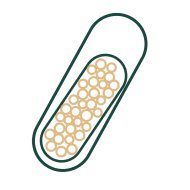
Do you have questions?
Need additional advice? No problem! Ask our team of experts. We'd love to hear from you.

In this episode of our podcast, we have the privilege of speaking with Prof. Depypere, an experienced gynecologist with a long career in guiding women through different stages of their lives, including menopause. In this podcast, we particularly focus on the role of bio-identical hormones.

Bestselling author and food scientist Amandine de Paepe enjoyed anextensive university education. Among other things, she studied biomedical sciences, nutritional sciences and obtained a European master's degree in nutritional sciences at the universities of Wageningen (NL), Cork (Ireland), Lund (Sweden) and Paris (FR). After her international career in the pharmaceutical sector, she threw herself into medical nutritional advice which she combined with analyses such as specific blood tests, DNA or sugar tests and personalized supplements. Over the years, Amandine turned her passion into her life's work. Today, she is the inspirer behind Insentials, the Belgian brand of vitamins & supplements.

Jona once earned a Master's degree in Psychology, but always had a strong interest in nutrition. A few years back, she therefore decided to pursue a Bachelor's degree in Nutrition and Dietetics. It's mainly the link between psychology and healthy eating that fascinates her the most: how do you create healthy habits in the long run? How do you maintain a healthy relationship with food? What's the effect of healthy food on your mental health?
With a passion for writing and organizing, she does a lot of copywriting and works on events at Insentials, always with a focus on science on the one hand and mental, physical health on the other.

Prof. Dr. Herman Depypere is a renowned gynecologist affiliated with the women's clinic at UZ Gent. He pursued studies in Ghent (Belgium), Birmingham (UK), Rotterdam (Netherlands), Adelaide (Australia), and Lille (France). He completed his biomedical doctorate in 1990 with the highest distinction. Prof. Depypere specializes in breast surgery and menopause. In addition to his research on the prevention and early detection of breast cancer, he investigates how life during menopause can be optimized.
During the conversation, Prof. Depypere points out that our perception of menopause has changed over time. Where a woman of 45 was once considered "old" and often had only a few years left to live, we now see that women of 45 are still very much in the prime of life. This means we must adjust our approach to the changing reality. Menopause is now a phase in the middle of life. The goal, therefore, should be to make this phase as healthy and pleasant as possible. Prof. Depypere emphasizes that this can be achieved through a combination of healthy eating, regular exercise, and the use of bio-identical hormones where necessary.

A significant part of the podcast focuses on bio-identical hormones. Prof. Depypere explains that bio-identical hormones are hormones that are structurally identical to the hormones naturally produced in a woman's body. He discusses how these hormones can be used to treat menopausal symptoms, such as hot flashes and night sweats. Prof. Depypere emphasizes that the use of these hormones helps replenish the hormones that the body loses during menopause. This can improve women's quality of life by helping them feel better and reducing the health risks associated with a lack of hormones.
During the conversation, Prof. Depypere discusses the many misconceptions surrounding hormone therapy. He makes a clear distinction between synthetic hormones, which are often used in contraceptives, and bio-identical hormones, which are specifically designed to mimic the body's natural estrogen and progesterone.
The negative connotation mainly comes from the association with the contraceptive pill, which is, for example, linked to a higher risk of thrombosis and arteriosclerosis. However, this does not apply to bio-identical hormones. Prof. Depypere explains that many women are therefore unnecessarily afraid of hormone therapy.

In the conversation, Prof. Depypere emphasizes the importance of preventive care. He explains that women should be regularly monitored during menopause, even if they feel well. This helps to detect issues such as high blood pressure and cholesterol early, allowing for prompt treatment. By taking preventive action, women can better manage their health and prevent future problems.

Prof. Depypere points out that within the medical field, and specifically in medical training, insufficient attention is paid to nutrition. He emphasizes that nutrition plays a crucial role in health, but that doctors often learn too little about it during their education. According to Prof. Depypere, there is a great opportunity to improve patient health by placing more emphasis on nutritional advice as part of medical care. He sees this as an important area where much can still be gained.